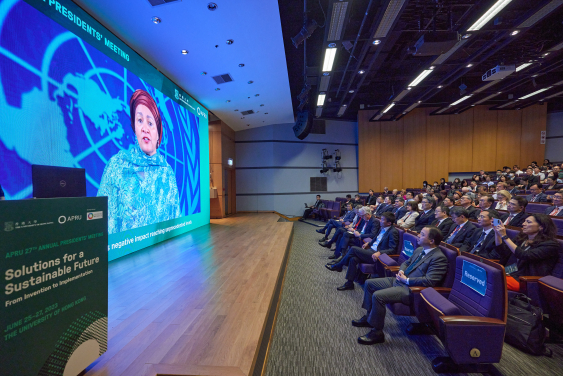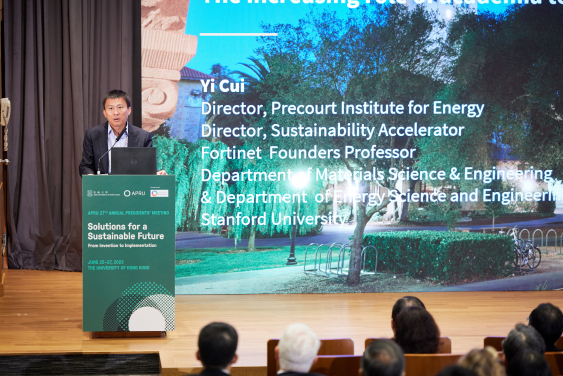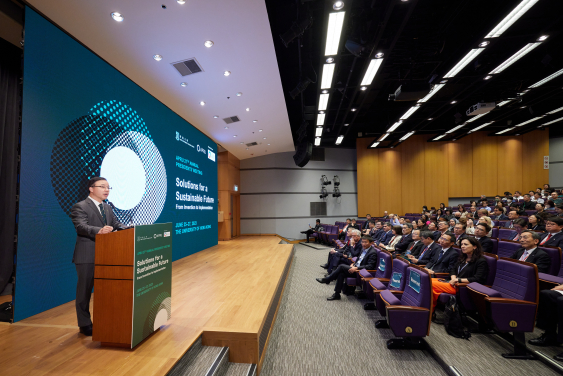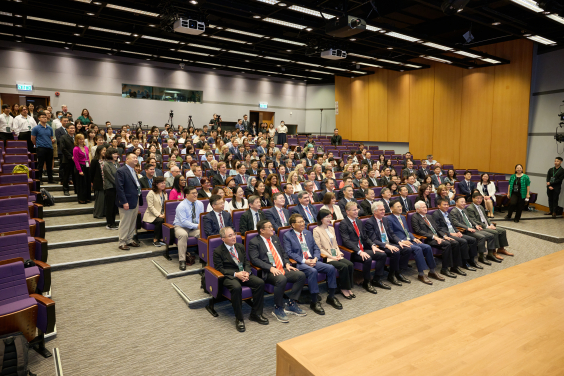傳媒
University Leaders and Top Scientists Advocate for Cross-Boundary Collaboration on Sustainability Issues (English only)
2023年06月27日
At the 27th Annual Presidents’ Meeting of the Association of Pacific Rim Universities (APRU) with the theme of “From Invention to Implementation – Solutions for a Sustainable Future”, more than 140 academic representatives from 51 institutions exchanged views on the joint contributions universities can make in tackling sustainability issues from climate change to social inequality, and reaching the United Nations goal of reaching net-zero carbon dioxide (CO2) emissions globally by 2050.
Professor Xiang Zhang, President and Vice-Chancellor of the University of Hong Kong, which is hosting the three-day event from June 25-27, noted the duty of university leaders to spearhead innovations that can make a real impact to people’s lives.
“At the University of Hong Kong, we are committed to addressing some of the most pressing questions such as socio-economic inequalities, sustainability and public health. Our research is focused on creating innovative, holistic solutions to these issues,” he said. “It is vital to develop new concepts, but we must also ensure such innovative ideas are put into practice. This requires collaboration across disciplines and sectors in local, national, and international settings.”
In his opening remark, Professor Gene D. Block, Chair of APRU and Chancellor of the University of California Los Angeles (UCLA) said: “Creating a sustainable future requires all of us to work together in order to find lasting solutions. The bond between our Asia-Pacific universities allows us to address critical global issues that impact so much of our world – even well beyond the Pacific Rim.”
Keynote speaker Professor Yi Cui, Fortinet Founders Professor of Stanford University, and the University's Director of Precourt Institute for Energy, highlighted the pivotal roles the academia plays in achieving a sustainable future. Citing the case of Stanford University, he stressed the importance for institutions to develop a strategic focus and devote resources to generating scalable solutions to achieve lasting impact.
Over the past 20 years Stanford has built an ecosystem to leverage its vast research talents. “It set up the Institute of Energy with the thinking in mind that the energy problem is so challenging that not only technology but also policy, economics, social behaviour need to come together to address the challenges. So we use the institute to integrate all the talents together. We have 300 faculties, more than 1,000 post-docs and graduate students working on energy-related topics,” said Professor Cui.
Professor Cui lauded the role universities worldwide can play in making great strides towards reaching various sustainability goals. “Universities are great places to integrate technology, economics and social behavior . They have the power to gather all relevant stakeholders to come to the same room to brainstorm, and are neutral places to genuinely discuss the right solutions for the whole world.”
“They are also places where there are lots of young talents to address the issues, and to educate many generations of young leaders who are full of energy and like white pieces of paper ready to have new things written on it. That is super important.”
Another keynote speaker, Ms Amina J. Mohammed, Deputy Secretary-General of the United Nations, and Chair of the United Nations Sustainable Development Group (SDG), called for further research, provision of education and collaborations among institutions. She said: “Students and future leaders can advance the SDG through their advocacy efforts and engagement and by aligning their academic pursuits with sustainability principles.”
The other speaker, Dr Simon Hoey Lee, is Vice President of China Resources Enterprise which leads projects to alleviate poverty in isolated villages in Mainland China. He invited university representatives at the Meeting to visit the township projects to share views and lend insights into reducing poverty, improving the quality of life of the numerous rural farmers in Mainland China.
The first day of the APRU event also featured panel discussions centered on topics of Our Planet, Our Future; Unleash Green Technologies to Power the Future. The discussions were led by presidents of various universities including Korea University, the National University of Singapore, Tohoku University and Yonsei University, among others.
About APRU
As a network of 60 leading universities linking the Americas, Asia, and Australasia, the Association of Pacific Rim Universities (APRU) brings together thought leaders, researchers, and policy-makers to exchange ideas and collaborate on practical solutions to the challenges of the 21st century. They leverage their members' collective education and research capabilities into the international public policy process. In the post-pandemic era, their strategic priorities focus on providing a neutral platform for high-level policy dialogue, taking actions on climate change, and supporting diversity, inclusion, and minorities. APRU’s primary activities support these strategic priorities with a focus on critical areas such as disaster risk reduction, women in leadership, indigenous knowledge, virtual student exchange, esports, population aging, global health, sustainable cities, artificial intelligence, waste management, and more. To learn more about APRU, please visit www.apru.org.
For Media enquiries, please contact:
HKU Communications and Public Affairs Office
Ms Melanie Wan (Email: melwkwan@hku.hk)
Ms Jaymee Ng (Email: ngjaymee@hku.hk)
Mr Kenneth Choi (Email: khkchoi@hku.hk)




